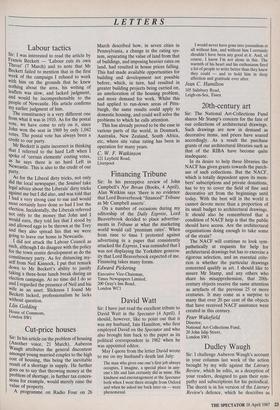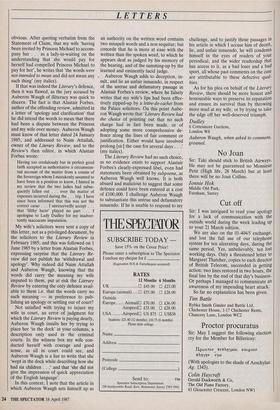Dudley Waugh
Sir: I challenge Auberon Waugh's account in your columns last week of the action brought by my wife against the Literary Review, which he edits, as a deception of your readers, designed to gain their sym- pathy and subscriptions for his periodical. The deceit is in his version of the Literary Review's defence, which he describes as
LETTERS
obvious. After quoting verbatim from the Statement of Claim, that my wife 'having been invited by Princess Michael to accom- pany her . . . as a lady-in-waiting on the understanding that she would pay for herself had compelled Princess Michael to pay for her', he writes that 'the words were not intended to mean and did not mean any such thing' (my italics).
If that was indeed the Literary's defence, then it was flawed, as the jury accused by Auberon Waugh of illiteracy was quick to discern. The fact is that Alastair Forbes, author of the offending review, admitted in a letter of 'apology and clarification' that he did intend the words to mean that there had been a dispute between the Princess and my wife over money. Auberon Waugh must know of that letter dated 24 January 1985, and addressed to Naim Attallah, owner of the Literary Review, and to the Review's then editor, in which Alastair Forbes wrote: Having too credulously but in perfect good faith accepted as authoritative a circumstan- tial account of the matter from a cousin of the Sovereign whom I mistakenly assumed to have been in a position to know, I hinted in my review that the two ladies had subse- quently fallen out . . . over the matter of expenses incurred during the . . . trip. I have since been informed that this was not the correct casus . . . I unreservedly accept . . . that 'filthy lucre' played no part . . . I apologise to Lady Dudley for my inadver- tently inaccurate imputation.
My wife's solicitors were sent a copy of this letter, not as a privileged document, by the solicitors to the Literary Review in February 1985; and this was followed on 1 June 1985 by a letter from Alastair Forbes, expressing surprise that the Literary Re- view did not publish his 'withdrawal and apology'. Why indeed did Naim Attallah and Auberon Waugh, knowing that the words did carry the meaning my wife imputed to them, put at risk the Literary Review by entering the only defence avail- able to them i.e. that the words carry no such meaning — in preference to pub- lishing an apology or settling out of court?
Not satisfied with trying to injure my wife in court, an error of judgment for which the Literary Review is paying dearly, Auberon Waugh insults her by trying to place her 'in the dock' in your columns, a description only used in the criminal courts. In the witness box my wife con- ducted herself with courage and good sense, as all in court could see, and Auberon Waugh is a liar to write that she `wept in the dock while describing how she had six children . . .' and that 'she did not give the impression of quick appreciation of the English language'.
In this context, I note that the article in which Auberon Waugh sets himself up as an authority on the written word contains two misspelt words and a non sequitur; but concede that he is more at ease with the written than the spoken word, to which he appears deaf as judged by his memory of the hearing, and of the summing-up by the learned and eminently lucid judge.
Auberon Waugh adds to deception, in- sult, and lie an unfair innuendo, in respect of the untrue and defamatory passage in Alastair Forbes's review, where he falsely writes that my wife's lips had been effec- tively zipped-up by a lettre-de-cachet from the Palace solicitors. On this point Aube- ron Waugh wrote that 'Literary Review had the choice of pointing out that no such charge had in fact been made, or of adopting some more comprehensive de- fence along the lines of fair comment or justification. Either would have involved prolong [sic] the case for several days . . (my italics).
The Literary Review had no such choice, as no evidence exists to support Alastair Forbes's clearly-expressed libel, even had statements been obtained by subpoena, as Auberon Waugh well knows. It is both absurd and malicious to suggest that some defence could have been entered at a cost of £100,000. I challenge Auberon Waugh to substantiate this untrue and defamatory innuendo. If he is unable to respond to my challenge, and to justify those passages in his article in which I accuse him of deceit, lie, and unfair innuendo, he will condemn himself in the eyes of readers of your periodical, and the wider readership that has access to it, as a bad loser and a bad sport, all whose past comments on the case are attributable to these defective qual- ities.
As for his plea on behalf of the Literary Review, there should be more honest and honourable ways to preserve its reputation and ensure its survival than by throwing more mud at my wife, or by trying to take the edge off her well-deserved triumph.
Dudley
6 Cottesmore Gardens, London W8
Auberon Waugh, when asked to comment, groaned.



















































 Previous page
Previous page